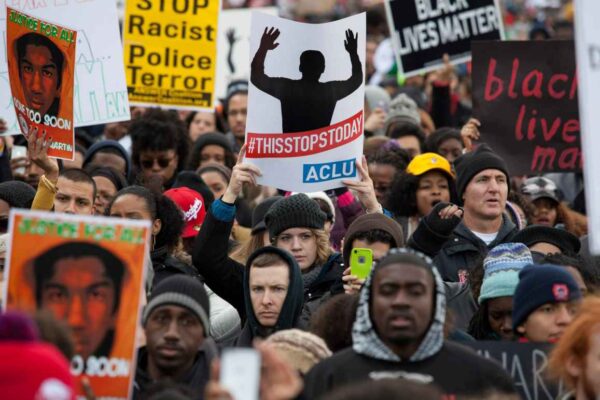NEW ORLEANS — This past Friday, the Louisiana Supreme Court ruled on two state law questions certified to it by the Fifth Circuit in a federal lawsuit against Black Lives Matter organizer DeRay Mckesson. The case will now return to the Fifth Circuit for further proceedings, guided by the state court’s conclusion that, under state tort law, protest organizers may be held accountable for the actions of those attending a protest.
The decision comes in Doe v. Mckesson, in which a police officer is seeking damages for being injured by an object thrown during a protest in Baton Rouge, Louisiana on July 9, 2016. The police officer did not sue the person who threw the object, but instead sued Mckesson, an alleged leader of the protest, which was sparked by the police killing of a Black man, Alton Sterling. The officer’s lawsuit claims Mckesson should be held legally responsible for the officer’s injuries simply because he allegedly led the protest.
The Louisiana Supreme Court held, purely as a matter of state tort law, that a person can be held liable for negligently precipitating the crime of a third party. David Goldberg of Donahue, Goldberg & Littleton argued the case before the state supreme court. The ACLU also represents Mckesson.
The following are comments from:
Vera Eidelman, staff attorney with the ACLU Speech, Privacy and Technology Project:
“Under the First Amendment, protesters–including protest organizers--cannot be held liable for the unlawful acts of others that they did not direct, order, or incite. The Louisiana Supreme Court may have held that there is no state law barrier to this lawsuit proceeding, but the First Amendment applies everywhere and bars this case. We look forward to making that clear as this litigation continues in federal court.”
Nora Ahmed, ACLU of Louisiana Legal Director:
“We are deeply disappointed in the Louisiana Supreme Court’s dangerous decision, which is an egregious attempt to silence the voices of the people of Louisiana. Holding a protest organizer liable for injuries an officer sustained during the protest is a direct attack on First Amendment rights. But this fight must continue, and we’re determined to make sure our residents retain the right to make their voices heard.”
Last year, the ACLU of Louisiana also filed a class action lawsuit on behalf of individuals who participated in peaceful protests in the wake of George Floyd’s murder and were met with excessive force. The complaint seeks to hold the responsible officers and their supervisors and enablers accountable for systemic discrimination against demonstrators exercising their right to protest police misconduct.
###
Stay Informed
Sign up to be the first to hear about how to take action.
By completing this form, I agree to receive occasional emails per the terms of the ACLU’s privacy statement.
By completing this form, I agree to receive occasional emails per the terms of the ACLU’s privacy statement.

